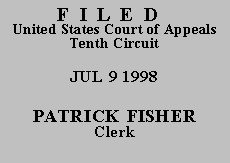

| UNITED STATES OF AMERICA,
vs.
KIMBERLY GIBSON |
|
§ 3B1.2. Ms. Gibson appeals these determinations. Our jurisdiction arises under 28 U.S.C. § 1291 and 18 U.S.C. § 3742, and we affirm.
Ms. Gibson argues that the application of USSG §1B1.2(d), which allows the court to consider the number of offenses which a defendant conspires to commit for purposes of sentencing, violates the Indictment Clause of the Fifth Amendment because it allows her to be punished as if she had been convicted of two separate conspiracies. Ms. Gibson pled guilty to the conspiracy charge, and the indictment specified the two bank robberies she admitted she participated in as overt acts. See I R. doc. 28 at 4-6; II R. at 35-40; United States v. Allen, 24 F.3d 1180, 1183 (10th Cir.), cert. denied, 513 U.S. 992 (1994) (explaining that guilty plea constitutes admission of acts described in indictment). The question of waiver aside, an indictment "need not set forth factors relevant only to the sentencing of an offender found guilty of [a] charged crime." Almendarez-Torres v. United States, 118 S. Ct. 1219, 1223 (1998). We thus reject Ms. Gibson's Indictment Clause argument.
Ms. Gibson also argues that in its application of USSG § 1B1.2(d), the district court erroneously found that she participated in two separate conspiracies. Ms. Gibson's argument, however, confuses the two objects of the conspiracy with the conspiracy itself. Ms. Gibson admitted that she participated in both the Powell and Worland bank robberies, which supports the district court's finding that Ms. Gibson conspired to commit these objects of the conspiracy for purposes of USSG § 1B1.2(d). Ms. Gibson's § 1B1.2(d) argument is accordingly unavailing.
Ms. Gibson finally argues that the district court's denial of a downward adjustment for minimal or minor participation pursuant to USSG § 3B1.2 was error. She asserts that the district court improperly considered her role in each overt act separately for purposes of assessing her involvement in the conspiracy pursuant to USSG § 3B1.2. The record belies this assertion, as the district court considered all the evidence before it relating to Ms. Gibson's participation in the conspiracy. See III R. at 24-25. Moreover, the district court may, but need not, make a specific comparison of the defendant's role in the conspiracy to that of her co-conspirators. See United States v. Caruth, 930 F.2d 811, 815 (10th Cir. 1991). In any event, the district court's determination that Ms. Gibson was more than a minor or minimal participant was not clearly erroneous. See United States v. McCann, 940 F.2d 1352, 1359 (10th Cir. 1991). Ms. Gibson admitted driving the getaway vehicle for the robbery in Worland. See II R. at 35-37. She knew about and was present during the Powell robbery; in fact, her need for travel money was a partial motivation for the robbery. See III R. at 17-18. Finally, she admitted she profited either directly or indirectly from the proceeds of three of the robberies. See II R. at 39-40. The district court's determination of this issue is fully supported by the record.
AFFIRMED. Ms. Gibson's Motion [to Set] Oral Argument or in the Alternative for a Decision on the Merits filed June 26, 1998 is deemed moot.
Entered for the Court
Paul J. Kelly, Jr.
Circuit Judge
*. This order and judgment is not binding precedent, except under the doctrines of law of the case, res judicata, and collateral estoppel. This court generally disfavors the citation of orders and judgments; nevertheless, an order and judgment may be cited under the terms and conditions of 10th Cir. R. 36.3.
**. After examining the briefs and the appellate record, this three-judge panel has determined unanimously that oral argument would not be of material assistance in the determination of this appeal. See Fed. R. App. P. 34(a); 10th Cir. R. 34.1.9. The cause is therefore ordered submitted without oral argument.